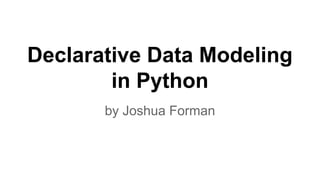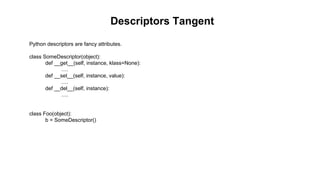Declarative Data Modeling in Python
- 1. Declarative Data Modeling in Python by Joshua Forman
- 2. Introducing valid_model It includes: - base class - Object - basic descriptors - Integer, Float, DateTime, String, ... - nesting descriptors - Dict, List, Set, EmbeddedObject
- 3. Most similar libraries are tightly integrated to a persistence layer: SQLAlchemy, Django ORM, mongokit, etc. Or are targeted at web forms: Formencode, colander, deform So the goal was to build a highly flexible unopinionated data modeling library.
- 4. Some Use Cases ŌŚÅ Database data model ŌŚÅ Form validation ŌŚÅ Test fixtures ŌŚÅ API request/response objects ŌŚÅ Scrubbing and normalizing data ŌŚÅ Data migration
- 5. car = { 'make': None, 'model': None, 'doors': None, 'horsepower': None, } class Car(object): def __init__(self, make=None, model=None, doors=None, horsepower=None): self.make = make self.model = model self.doors = doors self.horsepower = horsepower It is valid python to arbitrarily add new instance attributes in other methods, which can lead to headaches (and pylint complaints)
- 6. At least I know the fields ahead of time but what datatypes are these attributes? def horse_check(value): if value == 1: raise ValidationError('Is this powered by an actual horse?') elif value <= 0: raise ValidationError('Phantom horses?') return True class Car(Object): make = String(nullable=False) model = String() doors = Integer(validator=lambda x: x<=5) horsepower = Integer(validator=horse_check)
- 7. Nested Schemas is Easy class Person(Object): name = String(nullable=False) homepage = String() class BlogPost(Object): title = String(nullable=False, mutator=lambda x: x.title()) updated = DateTime(nullable=False, default=datetime.utcnow) published = DateTime() author = EmbeddedObject(Person) contributors = List(value=EmbeddedObject(Person), nullable=False) tags = List(value=String(nullable=False), nullable=False) def validate(self): super(BlogPost, self).validate() if self.published is not None and self.published > self.updated: raise ValidationError('a post cannot be published at a later date than it was updated') post = BlogPost(title='example post', author={'name': 'Josh'}, tags=['tag1', 'tag2']) >>> print post {'updated': datetime.datetime(2014, 10, 7, 13, 43, 1, 960174), 'author': {'homepage': None, 'name': u'Josh'}, 'contributors': [], 'title': u'Example Post', 'tags': [u'tag1', u'tag2'], 'published': None}
- 8. valid_model also provides something closer to strict typing class Car(Object): make = String(nullable=False) model = String() doors = Integer(validator=lambda x: x<=5) horsepower = Integer(validator=horse_check) >>> Car(doors='five') valid_model.exc.ValidationError: 'five' is not an int >>> Car(doors=10) valid_model.exc.ValidationError: doors >>> Car(horsepower=1) valid_model.exc.ValidationError: Is this powered by an actual horse? >>> Car(make=None) valid_model.exc.ValidationError: make is not nullable
- 9. Normalize your data when it gets set class HTTPAccessLog(Object): code = Integer(nullable=False) status = String(nullable=False, mutator=lambda x: x.upper()) timestamp = DateTime(default=datetime.utcnow) def validate(self): super(HTTPAccessLog, self).validate() if not self.status.startswith(unicode(self.code)): raise ValidationError('code and status do not match') >>> ping = HTTPAccessLog() >>> ping.code = 404 >>> ping.status = '404 not found' >>> print ping {'status': u'404 NOT FOUND', 'timestamp': datetime.datetime(2014, 10, 7, 13, 36, 15, 217678), 'code': 404}
- 10. Descriptors Tangent Python descriptors are fancy attributes. class SomeDescriptor(object): def __get__(self, instance, klass=None): ŌĆ”. def __set__(self, instance, value): ŌĆ”. def __del__(self, instance): ŌĆ”. class Foo(object): b = SomeDescriptor()
- 11. @property Descriptors @property is the most common class Foo(object): @property def a(self): return self._a @a.setter def a(self, value): self._a = value # Make an attribute readonly by not defining the setter. @property def readonly(self): return self._private_var #Lazily initialize or cache expensive calculations @property def expensive_func(self): if self._result is None: self._result = expensive_func() return self._result
- 12. Customizing Descriptors is Easy Extending existing descriptors works like subclassing anything else in python class SuperDateTime(DateTime): def __set__(self, instance, value): if isinstance(value, basestring): value = dateutils.parse(value) elif isinstance(value, (int, float)): value = datetime.utcfromtimestamp(value) super(SuperDateTime, self).__set__(instance, value) class Decimal(Generic): def __set__(self, instance, value): if not isinstance(value, decimal.Decimal): raise ValidationError('{} is not a decimal'.format(self.name)) super(Decimal, self).__set__(instance, value)
- 13. Simple wrappers for persistence An example of using MongoDB with Redis as a cache class PersistBlogPost(object): def __init__(self, mongo_collection, redis_conn): ... def insert(self, post): self.mongo_collection.insert(post.__json__()) def find(self, title): post = self.redis_conn.get(title) if post: return pickle.loads(post) else: post = self.mongo_collection.find_one({'title': title}) if post: post = BlogPost(**post) self.redis_conn.set(title, pickle.dumps(post)) return post
- 14. Thank You http://github.com/outbrain/valid_model Joshua Forman jforman@outbrain.com






![Nested Schemas is Easy
class Person(Object):
name = String(nullable=False)
homepage = String()
class BlogPost(Object):
title = String(nullable=False, mutator=lambda x: x.title())
updated = DateTime(nullable=False, default=datetime.utcnow)
published = DateTime()
author = EmbeddedObject(Person)
contributors = List(value=EmbeddedObject(Person), nullable=False)
tags = List(value=String(nullable=False), nullable=False)
def validate(self):
super(BlogPost, self).validate()
if self.published is not None and self.published > self.updated:
raise ValidationError('a post cannot be published at a later date
than it was updated')
post = BlogPost(title='example post', author={'name': 'Josh'}, tags=['tag1', 'tag2'])
>>> print post
{'updated': datetime.datetime(2014, 10, 7, 13, 43, 1, 960174),
'author': {'homepage': None, 'name': u'Josh'},
'contributors': [], 'title': u'Example Post', 'tags': [u'tag1', u'tag2'], 'published': None}](https://image.slidesharecdn.com/validmodeltalk-141016114729-conversion-gate02/85/Declarative-Data-Modeling-in-Python-7-320.jpg)






